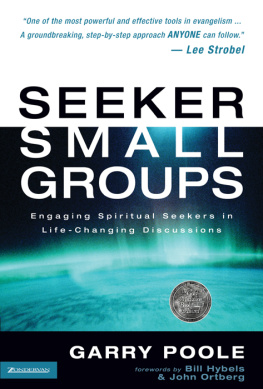
D OUGLAS M. C ECIL
M OODY P UBLISHERS
CHICAGO
2003 by
D OUGLAS M. C ECIL
All rights reserved. No part of this book may be reproduced in any form without permission in writing from the publisher, except in the case of brief quotations embodied in critical articles or reviews.
All Scripture quotations, unless otherwise indicated, are taken from the New American Standard Bible, Copyright The Lockman Foundation 1960, 1962, 1963, 1968, 1971, 1972, 1973, 1975, 1977, 1995. Used by permission.
Scripture quotations marked NIV are taken from the Holy Bible, New International Version. NIV. Copyright 1973, 1978, 1984 by International Bible Society. Used by permission of Zondervan Publishing House. All rights reserved.
Library of Congress Cataloging-in-Publication Data
Cecil, Douglas M., 1952
The seven principles of an evangelistic life / Douglas M. Cecil.
p. cm.
Includes bibliographical references.
ISBN 0-8024-0924-5
1. Evangelistic work. 2. Christian life. I. Title.
BV3793.C43 2003
269.2dc21
2003005465
We hope you enjoy this book from Moody Publishers. Our goal is to provide high-quality, thought-provoking books and products that connect truth to your real needs and challenges. For more information on other books and products written and produced from a biblical perspective, go to www.moodypublishers.com or write to:
Moody Publishers
820 N. LaSalle Boulevard
Chicago, IL 60610
3 5 7 9 10 8 6 4 2
Printed in the United States of America
to my bride of thirty years,
Patty,
who has continued to encourage me
to abide in Christ
CONTENTS
1. Fly the Airplane!
Principle 1:Keep your priorities straight.
3. How Does This All Fit Together?
Principle 2:Evangelism is an event in the process of disciple making.
6. What Did You Say?
Principle 3:Make the Gospel clear.
7. Springing from the Inside Out
Principle 4:Evangelism is more spiritual than methodological.
9. Are You Passive or Active?
Principle 5:Being a good witness means passionately pursuing the lost in love.
11. Send in the Herd!
Principle 6:Evangelism moves forward as Gods people get involved in ministry and service.
15. Helping Them Grow
Principle 7:Disciple, nurture, and assimilate new believers into the church.
THE WORD EVANGELISTIC has faded and frayed in the storm of religious fervor and propaganda sweeping through the worlds jittery population. Haunted by guerilla tactics on nearly every continent, thinking people cower at the thought of being approached by someone with strong convictions.
Evangelism is defined generically in the American Heritage Dictionary as the zealous preaching and dissemination of the Gospel, as through missionary work. Thanks to our modern secular media, preachers and missionaries are often identified with oddballseither pale, beady-eyed creatures intent on casting some sort of spell on others, or a hyped-up quasi-entertainer with a hard-sell approach to a particular brand of belief.
The evangel is the good news about what God has done for the hopeless plight of mankind. No one should be denied the privilege of hearing about events that are critically important to life and death. Yet the Enemy tries constantly to obscure the facts with his own spin to paint a veneer of ridicule and contempt over the truth.
Nowhere does God command unbelievers to go to church, but the Bible clearly commands believers to penetrate the world with His . Some are particularly gifted at addressing large numbers of people with the Good News, and God moves on the hearts of the hearers to respond in faith. Others are incredibly effective with small groups or in private encounters, presenting the simple truth that God loves the world and receives anyone who will turn and believe in Him.
Christian lifestyle remains in the minds of most believers as an optional choice. Our human propensity for doing what we please, currently termed our rights, seems to justify that we can live in our culture according to our desires and simply add on whatever church affiliation makes us feel most comfortable. On a hospital entrance form we would check the space for Christian to designate what form of burial we might require.
Many of us forget that following Christ requires resignation of our rights, that we have signed on to please Him, not ourselves. This is a key theme in Doug Cecils book The 7 Principles of an Evangelistic Life. Christs will is that all will come to believe Him, and that requires unremitting vigilance for every believer. Every contact with us should be like hopping into a demo automobile to enjoy the luxury of a few minutes with a real God-like person.
This book pulls into clear focus how a believer should behave on a daily basis. Since God leaves us here in this world after we place our faith in His Son, instead of taking us immediately home to heaven, His purpose is that we are to become spiritual lighthouses and a purifying element in a decaying societyno matter our specific occupations.
With our hereditary baggage of sin and our cultural peer pressure distorting the very idea of a loving God, the task of living every day as a reflection of His grace becomes a challenge. Doug Cecil has translated abstract daily life into practical how-tos, the art of living an example for others to see the power of the Christ-life everyday.
H OWARD G. H ENDRICKS
Distinguished Professor and Chairman
Center for Christian Leadership
Dallas Theological Seminary
A BOOK GOES through many stages. I am deeply grateful to many who played a part in making this book possible.
I am thankful to the faculty, staff, and administration of Dallas Theological Seminary who have allowed me the opportunity to grow and develop. The faculty have always challenged me with their commitment to biblical excellence and accuracy. The staff have always encouraged me with their sacrificial service. The administration have always inspired me with their vision, faithfulness, and commitment to staying the course.
I thank the long line of Bible teachers, mentors, and colleagues who have influenced and changed my thinking over the years. Anyone in the Christian life knows that most of the ideas probably came from someone else and are just distilled and compiled here for your reading. Thank you to those faithful servants who have gone before.
I thank the students of Dallas Seminary who over the years have challenged my thinking and have helped crystallize my thoughts. Many of their thoughts have become my thoughts.
A special thanks to Mrs. Shannon Stevens who read the manuscript to make sure that each sentence had a verb. I also extend warm thanks to my close friend Reverend Jeff Townsend. Jeff is a gifted Bible teacher with a keen mind for detail. All of his suggestions were incorporated into the final draft. He sacrificially gave of himself to minister to me in this way.
I thank Moody Publishers for having the courage to print a book on evangelism. That is not normal for publishing houses today. Moody has a history of being on the front lines of evangelicalism and challenging the church and believers to a radical dependence upon Jesus Christ.









